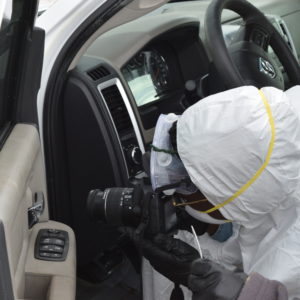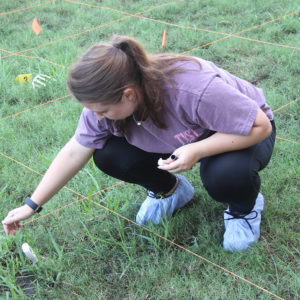No. 1 ranking in US for Texas A&M forensic, investigative sciences major
Writer: Laura Muntean, 979-847-9211, laura.muntean@ag.tamu.edu
Contact: Dr. Jeffery Tomberlin, 979-845-9718, jktomberlin@tamu.edu
COLLEGE STATION — Texas A&M University’s forensic and investigative sciences major in the department of entomology was named No. 1 out of the top 25 programs in the U.S. by Bachelor’s Degree Center, http://bit.ly/TAMUrankedNo1.

The BDC took a look at cost, reputation, alumni salary, graduation rate and job placement rate to come up with their rankings, and all programs had to be accredited by the Forensic Science Education Programs Accreditation Commission, or FEPAC.
Texas A&M’s program offers two emphases, pre-law and science, and is one of two accredited undergraduate forensic programs in the state.
The program was established in 2007 and accredited by FEPAC in 2012, said Dr. Jeffery Tomberlin, director of the forensic and investigative sciences program. “The primary focus of our degree is on criminalistics with an emphasis in chemistry and biology.”
Tomberlin takes pride in the skills that students learn throughout the program, which provides them with the opportunity to be successful whether testifying in a courtroom or working in a boardroom, he said.
“Basically, the skills they develop while matriculating through the forensic science program allow them to be prepared for challenges in any profession- regardless if in forensics, law, business, medicine, or any other profession,” Tomberlin said.
Students who complete the program are now working in crime laboratories, practicing law or medicine, teaching, or pursuing graduate degrees in areas including forensic chemistry, anthropology, entomology and basic research in genetics, he said.

“The students are what make such a difference in the program as well as the advising team and teaching faculty,” Tomberlin said. “The staff and faculty work very hard to guide students effectively through this program.”
“Each year, I am amazed by the diversity of students to enter our program and their unique perspectives of the forensic sciences,” he said. “They represent what is best about Texas A&M University with their commitment to education and community, and they contribute to society in a positive fashion.”
“Dr. Tomberlin’s vision and leadership of this program is nothing short of remarkable,” said Dr. David Ragsdale, chief scientific officer and associate director for Texas A&M AgriLife Research. “I’ve witnessed the high quality of our FIVS graduates and some of the success stories of where these students are today, and I agree with this No. 1 ranking of the FIVS major.”


